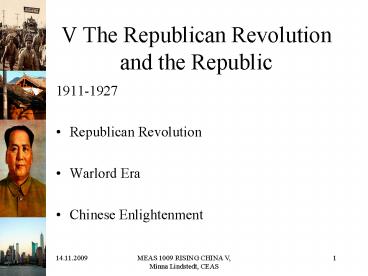V The Republican Revolution and the Republic - PowerPoint PPT Presentation
1 / 20
Title:
V The Republican Revolution and the Republic
Description:
Wide range of backgrounds and different ways of maintaining power: ... Central patriotic ground: unified China coping with warlordism, exploitative ... – PowerPoint PPT presentation
Number of Views:37
Avg rating:3.0/5.0
Title: V The Republican Revolution and the Republic
1
V The Republican Revolution and the Republic
- 1911-1927
- Republican Revolution
- Warlord Era
- Chinese Enlightenment
2
Republican Revolution 1901-1916
- Gentry-elite acting instead of the Qing
government - Qing reform efforts came into nothing ? Qing
government had been superficial, passive and
parasitic for too long - Revolution 1911
3
The Republic Born 1911/1912
- Revolution 1911 double ten revolt at Wuhan ?
provinces declare independence from Qing - 1.1.1912 a republic born in Nanjing Sun Yatsen
president, Yuan Shikai head of government,
parliament and provincial assemblies - Yuan Shikai as president ? reassertion of
autocracy
4
The Republic of China 1912-1927
- Yuan Shikai Trust only central power
- Conservatism thwarted social revolution
- Chinese tradition inimical to the parliamentary
experiment
5
The Republic of China 1912-1927
- Military governors (dujun)? warlords
conservative gentry? lineages preserving local
dominance - 1. Cultural focus influx of foreign goods,
ideas, ways - 2. Socio-political focus charasterics of an
interregnum between dynasties
6
The Republic of China Economy
- Rate of industrial growth in coastal China as
high as Japanese "miracle" - Average real income of Chinese peasants actually
rising - 1912-1933 China's per capita gdp grew from Ch113
to Ch123 - Economic growth geographically limited
7
Decade of Warlords 1916-1927
- New republic born, then fallen into pieces
- A political history of China as a united country
virtually ceases - 1913-1928 constant civil war led by warlords
- A low point of state power, paradoxically
considerable achievement in cultural, social and
economic lines
8
Created by the US Military Academy (West Point)
retrieved from http//www.dean.usma.edu/history/we
b03/atlases/chinese20civil20war/chinese20civil
20war20index.htm
9
Origins of Warlordism
- Government throughout the provinces militarized
- Disappearance of traditional forms of social
control ? total breakdown of law and order that
the emergence of war-lords partially reintegrated - Bankruptcy of the central government provinces
used the collected revenue to keep their own
forces
10
Origins of Warlordism
- ? Feudalization of government Authority based on
the allocation of territory and its revenues to
subordinates in return for military service - Rapid rise of modern armies careers with simple
talent education not a necessity given the
simplicity of warfare in China then building of
new armies through military schools? entry to the
officer corps possible also for very poorest? now
ruled China
11
On Warlords
- Wide range of backgrounds and different ways of
maintaining power - Beiyang/ units of national army/ provincial
armies and local militia/ local thugs, bandits - From whole provinces to a handful of towns
- Finances from taxing locals (own bureaucracy or
at gunpoint) - A whole range of ideals presented for the
republic/ GMD/ modified Confucianism/
Christianity/ working with foreigners...
12
Source Fenby, Jonathan (2003). Generalissimo.
13
Effects of Warlordism
- Some controlled subordinates, enforced order,
attempted reforms - Others showed less interest in good government
and reform savage brutes - Destructive warfare, supplementary taxation,
opium growing gt burden on people throuhout most
of China - Wars labour-intensive armies living off the
country arbitrary conscription defences against
floods neglected
14
Effects of Warlordism
- Period culminated in the famines of 1929 in which
consequences of war played major role - Militarization of the countryside overturned
normal social relationships and inflicted
irreversible damage on the structure of
traditional society
15
Chinese Enlightenment
- New Culture Movement
- Western thought through Japan by Chinese scholars
residing in Japan - Literary revolution to use everyday speech in
written form (wenhua ? baihua) - Expose common tendencies toward self-submission
- A new generation May 4th Movement of 1919
16
May 4th Movement of 1919
- Origin in Chinas disappointment in the aftermath
of the First World War - Attempt to redefine China's culture as a valid
part of the modern world - Attack agains "old ways" of Confucianism,
patriarchal family, arranged marriages,
traditional education
17
May 4th Movement
- Reform of the Chinese writing style
- Deep interest in Western art and culture
- Problem-solving approach to analyze China's
problems and address them - Inspiration from socialist, marxist and feminist
critiques, change through radical activism
18
May 4th Movement
- Central patriotic ground unified China coping
with warlordism, exploitative landlord system and
foreign imperialism - Country-wide phenomenon but thinking behind it
mostly from Beida - Yan Fu, Cai Yuanpei, Chen Duxiu, Hu Shi, Lu Xun
19
May 4th Movement
- Prominent figures of first generation believed in
the domain of words - Next generation saw the true meanin of the
Movement in recognition that the time had come
for action
20
Reading and Questions for Tutorials
- Reading Lu Xun's novel The True Story of Ah Q
- Discuss the metaphors found in the novel in
relation to the political history of the times in
question

